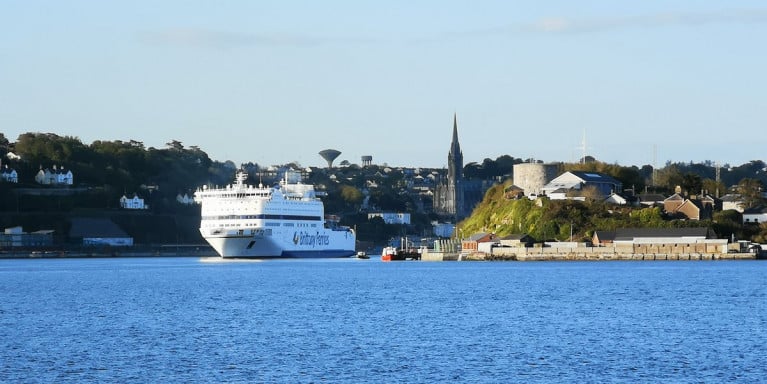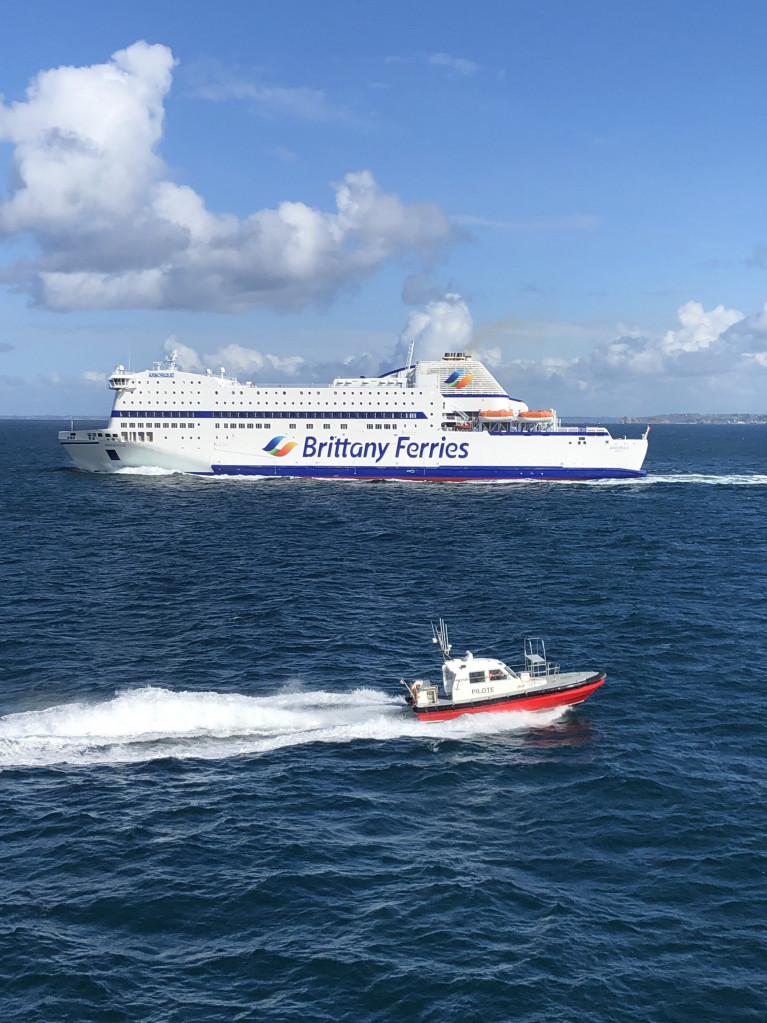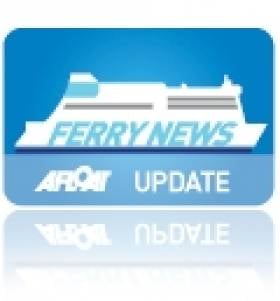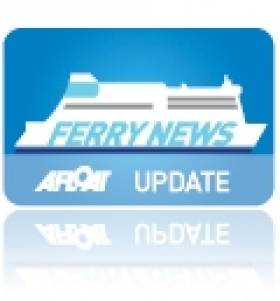Displaying items by tag: FreightOnly
Newest Brexit-Bypass As Brittany Ferries 'Freight' Route Network Includes Call to Cork
Brittany Ferries Armorique arrived into Cork Harbour this afternoon after the cruiseferry completed an inaugural new Brexit-bypass France-Ireland 'freight' only route from St.Malo, writes Jehan Ashmore
Afloat tracked Armorique's arrival some ten minutes earlier than the 15:00hrs scheduled time when berthing at the Port of Cork's Ringaskiddy Ferry Terminal.
The maritime milestone marked the second leg of Brittany Ferries four-route network of Brexit-bypass freight-only services: Rosslare-St. Malo, St. Malo-Cork, Cork-Roscoff and Roscoff-Rosslare, thus forming Armorique's rotational routes roster.
Due to the impacts of Brexit coupled with Covid-19, the cruiseferry Armorique otherwise would be operating crossings on the western English Channel route of Roscoff-Plymouth. In addition to providing annual winter cover for fleetmates undergoing dry-docking maintenance etc.
This afternoon's occasion in Cork Harbour followed the launch of the first route leg when Armorique departed Rosslare Europort on Thursday bound for St.Malo. This was another first, as the freight ro-ro route links the region of Brittany and Co. Wexford.
The St. Malo-Cork route it should be noted Brittany Ferries previously operated as a passenger service too in 1993 when the Ireland-France seasonal route including to Roscoff were both operated by Duchesse Anne. The ex. Connacht of B&I Line built in 1979 at the former Verolme Cork Dockyard, made its maiden sailing from Cork to Swansea on 7th February (42 years ago!).
The four freight routes response by Brittany Ferries to providing Irish hauliers an alternative to the UK landbridge and related customs, is easily the most comprehensive compared to rival operators using Rosslare Europort, Stena Line to Cherbourg, and newcomer DFDS to Dunkirk. This been in terms of running four routes though with operating services with just a single ship.
While Irish Ferries recently redeployed ropax Epsilon on the Dublin-Cherbourg link with a weekend round trip boosting capacity to last months introduced cruiseferry W.B. Yeats, therefore with considerably more cabins for Covid related driver accompanied traffic.
Before Covid, normal 'seasonal' sailings were to resume by W.B. Yeats but much later in May, marking the start of shoulder season and into summer holidays on the year round operated route.
In relation to seasonality, Brittany Ferries began entering the Irish marketplace with the establishment of the Cork-Roscoff route in Spring, 1978 and by the 'original' Armorique. This for the first time benefited holidaymakers on the new link between the southern city and mainland continental Europe.
According to Cork Beo, the new freight-only routes will operate until the end of March, when scheduled freight and passenger services will resume between Cork and Roscoff (two months earlier than planned). Frequency on the route will double for 2021 with two weekly sailings in each direction.
Prior to the pandemic, plans by Brittany Ferries were at an advanced stage for a new direct freight and passenger service from Cork to Santander in Spain. If the plan is reaslised it could revive trade between the south coast and France and Spain as traffic increases dramatically.
The revival, Afloat adds refers to the French operator that previously inaugurated the first ever direct Ireland-Spain route launched only in 2018. This however was shortlived as the ferry company only last year switched to a new Rosslare-Bilbao route following demands by hauliers to suit their operations. (See also new Cherbourg service below).
In addition, Cork Beo added, Brittany Ferries is understood to be still considering new ro-pax (freight and passenger) routes out of Cork for the Spring/Summer season, once travel returns to normal.
The rival of Rosslare-Roscoff, Afloat adds followed Irish Ferries closure in recent years, however the Breton company's service was shortlived as further calls from hauliers dictated the ferry scene. This led to the service dropped as Cherbourg is deemed more of a transport hub. As alluded above, Brittany Ferries opened a new Rosslare-Cherbourg service last month on the route in competition with Stena Line which also recently added a new freight only route to Dublin.
As for Armorique, a next departure looms (18:00hrs) on the third leg of Cork-Roscoff route, which by then will be the half-way stage of six in total of the combined four routes.
A lay-over period however awaits Armorique back in its Breton homeport tomorrow before the ferry returns to Cork on Tuesday, then its back again to Roscoff arriving Wednesday. The next sailing from Brittany is to Rosslare Europort with an arrival on Thursday to complete the circuit.
The new freight routes follow ferry freight only operator, CLdN's decision in recent months to add a second weekly con-ro (container/vehicle) service on the Cork-Zeebrugge route that was launched last May.
Afloat will have more on a previous operator(s)? among them Cork-St. Malo Ferries using a former DFDS freighter with limited passenger capacity.
New Services As Brittany Ferries Introduce Three Weekly 'Freight' Sailings On Ireland-France Links
Operator Brittany Ferries has announced that it is introducing three new weekly 'freight' only sailings between Ireland and France as the company previously alluded.
The sailings will begin this Thursday, 4th February on a (new route) linking Rosslare Europort and St Malo.
The first of two (new sailings) out of Cork to Roscoff will begin this Saturday.
These sailings are in addition to the current Brittany Ferries sailings out of Cork and Rosslare to both France and Spain. The new sailings are in response to demands from both Irish and French hauliers seeking a more direct route.
Normally most lorries travelling between Ireland and France transit via the UK, using ferry services across the Irish Sea and English Channel. However, since new post-Brexit trade rules were introduced on January 1st increasing numbers of Irish and continental hauliers have been deterred from using this ‘landbridge’ due to increased customs checks and paperwork.
- Company responds to demand for more direct Ireland France freight links
- New route: Rosslare - St Malo (sailings begin this week on Thursday)
- Two new sailings on Cork - Roscoff (begins on Saturday)
- First freight only services for Ireland from Brittany Ferries
- (Afloat adds further new routes: Rosslare-Roscoff /Cork-St.Malo with the latter as referred below).
Hugh Bruton, General Manager, Brittany Ferries Ireland, commented: “It’s clear that Brexit has distorted flows of trade between France and Ireland, there’s now clear and compelling demand both in Brittany and beyond to boost freight capacity direct from the region to Ireland. And Irish traders too are seeking direct links to Western France. We’re always listening to our haulier customers in order to best meet their needs and we look forward to restarting Brittany-Ireland services two months earlier than planned.”
The new Brittany-to-Ireland sailings come in addition to an extra weekly Rosslare to Cherbourg round trip which was introduced in mid-January. This means that from February Brittany Ferries will offer hauliers a choice of eight sailings a week in each direction between Ireland and France.
The company also offers two weekly roundtrips between Rosslare and Bilbao, northern Spain. Altogether the company will be offering 12 sailings a week linking Ireland with France and Spain.
Conor Mowlds, Chief Commercial Officer, Port of Cork said: “The decision by Brittany Ferries to operate two freight only services from Cork to St Malo and Roscoff is hugely positive for Cork. Importers and exporters now have further transport options to get their freight direct to the EU and bypass the UK Land-Bridge. This announcement comes in the same month as we announced a second freight service from Cork to Zeebrugge. These direct freight services from Cork to the EU strengthen the region by offering more flexibility to Irish customers, ensuring supply chains are maintained. Our relationship with Brittany Ferries spans over 40 years and it continues to go from strength to strength. We wish them every success with this freight service.”
Glenn Carr, General Manager, Rosslare Europort adds: “The continuing commitment of Brittany Ferries to develop new services linking Irish industry to the European continent is once again demonstrated with this new service connecting to St Malo and Roscoff. We have worked closely with Brittany Ferries to facilitate this new service, which will give further choice and capacity alongside existing Brittany Ferries services between Rosslare Europort and Bilbao and Cherbourg.”
These new freight only routes will operate until the end of March, when scheduled freight and passenger services will resume between Cork and Roscoff. With two weekly sailings in each direction, frequency has been doubled for 2021.
Irish Authorities Approve Stena / DFDS Merger
Of the two services, the Belfast-Liverpool (Birkenhead) is for passengers and freight while the and Belfast-Heysham port route is exclusively for freight-only users. To read more about the decision from the authority click here.
In February the UK's Office of Fair Trading (OFT) referred Stena AB's acquisition from DFDS A/S to the Competition Commission, conclusions on the report are not expected to be made until 25 July. To read more about the merger click here.
In the meantime the Belfast-Liverpool (Birkenhead) route continues trading under the name of Stena Line Irish Sea Ferries Ltd which is separately operated to Stena Line's other Irish Sea routes.
Sailings on the 8-hour route are run by the Italian built 27,510 tonnes ro-pax twins Lagan Seaways and Mersey Seaways which have been in service since the newbuilds were launched in 2005.
As the acquisition remains subject to regulatory clearance, passengers intending to travel on the route can continue to make bookings through the DFDS Seaways website by logging onto this link.
In addition the acquisition involved the sale of the South Korean built freight-ferries Hibernia Seaways and Scotia Seaways which operate Belfast-Heysham sailings.
Seatruck to Re-Open Dublin-Heysham Route
Seatruck Ferries is to re-open the Dublin-Heysham route following the closure by DFDS Seaways of the freight-only service last month, writes Jehan Ashmore.
The first sailing of the revived route is scheduled to depart Heysham next Monday at 02.00hrs and the corresponding departure from Dublin is at 14.00hrs. Seatruck have yet to release the identity of the one-ship operated service, previously run by DFDS Anglia Seaways.
Seatruck decided to re-open the route based on strong demand and of the firm commitment to support the service from several road haulage firms.
To facilitate the additional business of the new route, Seatruck's existing use of Terminal 3 for its Dublin-Liverpool service will no longer be required. Instead all operations will be centred at Terminal 5, previously used by DFDS Seaways for their freight and passenger ferry vessels on the Heysham and Liverpool (Birkenhead) routes.
The company which is part of the Bahamas based Clipper Group Ltd (which controls 250 vessels) also operate between Warrenpoint-Heysham and Larne-Heysham. Seatruck operate an eight–strong Irish Sea fleet, which include four new vessels that were built in Spain and introduced onto two of their routes since 2008.
Lead-ship of the four 120-trailer capacity vessels, Clipper Point was followed by Clipper Panorama on the Warrenpoint route. The Clipper Pace and the final unit of the quartet, Clipper Pennant, serve on the Liverpool route. The new Dublin-Heysham route will increase the total number of all Seatruck route sailings to 80 each week.
































































